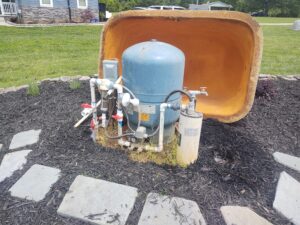Trustworthy Pump Repairs & Installation: Your Water supply's Lifeline
Trustworthy Pump Repairs & Installation: Your Water supply's Lifeline
Blog Article
Understanding the Key Components of Effective Water Filtering Systems

Value of Water Purification Equipment
Water filtering systems play an essential duty in ensuring access to secure and clean drinking water by efficiently getting rid of contaminants and contaminations. These systems are necessary in addressing the expanding problems over water top quality and the prospective health dangers related to eating infected water. By making use of different filtration devices such as reverse osmosis, triggered carbon, and UV sanitation, water filtering systems can efficiently get rid of hazardous materials like microorganisms, infections, hefty steels, and chemicals from the water system.
Furthermore, water purification systems help to enhance the taste and smell of water by removing chlorine, debris, and other contaminants that can influence its quality. Pump repairs & installation. This enhancement in water high quality not only makes it much more tasty but additionally urges people to drink a sufficient amount of water daily, advertising much better hydration and general wellness
Kinds Of Purification Components

Physical filters are designed to literally strain out contaminations from the water. These filters can be made of products like ceramic, carbon, or even sand, and they work by capturing bits larger than the filter's pores as water goes through.
Chemical filters use numerous chemical procedures to remove contaminants from the water. Examples include activated carbon filters, which adsorb impurities, and reverse osmosis membranes, which use stress to separate contaminants from the water.
Biological filters utilize living microorganisms like algae or microorganisms to damage down natural matter and contaminants in the water. These filters are commonly made use of in wastewater treatment plants or all-natural water filtration systems.
Recognizing the different kinds of filtering elements is critical for picking the most suitable water filtering system for details purification needs.
Feature of Debris Filters
Sediment filters play a critical duty in water filtration systems by effectively capturing strong fragments put on hold in the water. These filters are typically the very first line of defense in a filtering system, eliminating Visit Website bigger particles such as sand, silt, dirt, and corrosion before the water relocates through finer purification stages. By trapping these debris, the filters avoid them from reaching downstream elements, therefore extending the lifespan and performance of the whole system.
The feature of sediment filters is essential in maintaining water high quality and securing sensitive equipment from damages brought on by debris. Furthermore, by removing visible bits, debris filters improve the clarity and taste of the water. Consistently cleaning or replacing debris filters is vital to make sure optimal performance. Overlooking this upkeep can lead to clogging, reduced water circulation, and jeopardized filtering effectiveness. Generally, sediment filters are important parts that contribute considerably to the efficiency of water filtration systems.
Function of Triggered Carbon Filters
Playing a crucial role in water filtration systems, triggered carbon filters are instrumental in removing impurities and contaminants from the supply of water. These filters are developed to adsorb and catch a vast array of pollutants, including chlorine, unstable organic substances (VOCs), pesticides, and herbicides. The triggered carbon product has a big area, enabling the reliable trapping of contaminants via a procedure called adsorption. As water goes through the filter, the triggered carbon brings in and holds onto the impurities, ensuring that the water that appears beyond is cleaner and safer for usage.
Activated carbon filters are highly reliable at improving the taste and smell of water by lowering chemicals that can affect its top quality. Due to their adaptability and reliability, activated carbon filters are an essential component in ensuring that water is purified to the highest their explanation criteria before getting to customers.
Understanding Reverse Osmosis Systems
Reverse osmosis systems are advanced water filtering systems that employ a sophisticated process to eliminate pollutants and impurities from drinking water. These systems function by applying stress to the water, forcing it through a semi-permeable membrane. This membrane functions as an obstacle, allowing just pure water particles to go through, while obstructing bigger molecules such as minerals, chemicals, and other impurities. Consequently, the water that comes out beyond is significantly cleaner and safer for intake.
One trick benefit of reverse osmosis systems is their capacity to remove a variety of contaminants, consisting of hefty steels, dissolved bacteria, solids, and infections. This makes them very efficient in enhancing the general top quality and safety of alcohol consumption water. Additionally, reverse osmosis systems are fairly low-maintenance and can be set up under the sink or in a main purification system, providing convenient access to clean water throughout the household. Generally, understanding how reverse osmosis systems function can assist individuals make educated choices regarding their water filtration requirements.
Verdict
In verdict, effective water purification systems are crucial for ensuring secure and clean drinking water. By understanding the feature and role of each part, individuals can make informed decisions when choosing a water filtering system.
Water filtering systems play an essential role in making sure access to safe and clean drinking water by properly eliminating contaminants and pollutants. By utilizing different purification devices such about his as reverse osmosis, triggered carbon, and UV sterilization, water purification systems can effectively get rid of dangerous materials like germs, viruses, hefty steels, and chemicals from the water supply.
Sediment filters play an important duty in water purification systems by successfully catching solid particles suspended in the water (Water Filtration Systems).Playing an essential duty in water purification systems, turned on carbon filters are critical in getting rid of impurities and pollutants from the water supply.Reverse osmosis systems are innovative water filtration systems that utilize an innovative procedure to get rid of contaminants and impurities from drinking water
Report this page